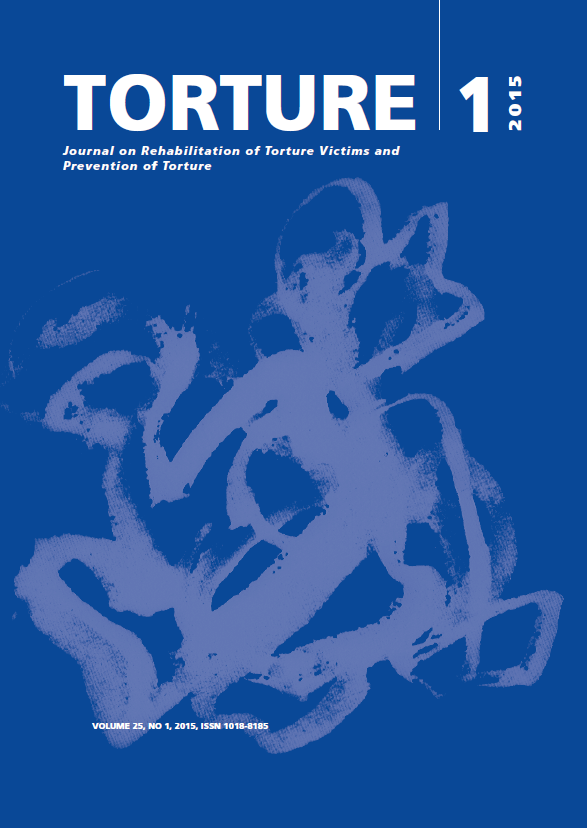Statement on Virginity Testing
Independent Forensic Expert Group
DOI:
https://doi.org/10.7146/torture.v25i1.109509Keywords:
virginity examination, medico-legal statement, forcibly conducting examinations, cruel, inhuman, or degrading treatment, torture, Independent Forensic Expert Group, ill-treatment, international human rights standardsAbstract
Virginity examinations are practiced in many countries, and often forcibly, in a number of contexts, including in detention places; on women who allege rape; on women who are accused by authorities of prostitution; and as part of public or social policies to control sexuality. In other states, the practice is illegal.
The purpose of this medico-legal statement is to provide legal experts,
adjudicators, healthcare professionals, and policymakers, among others, with an understanding of the physical and psychological effects of forcibly conducting virginity examinations on females and to assess whether, based on these effects, forcibly conducted virginity examinations constitute cruel, inhuman, or degrading treatment or torture. This medico-legal statement also addresses the medical interpretation and relevance of such examinations and the ethical implications. This opinion considers an examination to be ‘forcibly conducted’ when it is “committed by force, or by threat of force or coercion, such as caused by fear of violence, duress, detention, psychological oppression or abuse of power, against such person incapable of giving genuine consent.”
For full details about the Independent Forensic Expert Group please visit http://www.irct.org/our-support/ medical-and-psychological-case-support/forensic-expertgroup.aspx.
References
2. United Nations Office of the High Commissioner for Human Rights. Manual on the Effective Investigation and Documentation of Torture and Other Cruel, Inhuman or Degrading Treatment or Punishment (the “Istanbul Protocol”). United Nations; 2004. HR/P/PT/8/Rev.1.
3. United Nations. Rules for the Treatment of Women Prisoners and Non-custodial Measures for Women Offenders (the “Bangkok Rules”). United Nations; 2010 Oct. A/C.3/65/L.5.
4. World Health Organization. Guidelines for the Medico-legal Care for Victims of Sexual Violence. World Health Organization; 2003 Jan.
5. United Nations. Promotion and protection of all human rights, civil, political, economic, social and cultural rights, including the right to development: report of the Special Rapporteur on Torture and Other Cruel, Inhuman or Degrading Treatment or Punishment, Manfred Nowak. United Nations; 2008 Jan. A/HRC/7/3.
6. United Nations. Preliminary report submitted by the Special Rapporteur on Violence Against Women, Its Causes and Consequences, Rashika Coomaraswamy, in accordance with Commission on Human Rights resolution 1994/45. United Nations; 1994 Nov. E/CN.4/1995/42.
7. United Nations. Report of the Committee on the Elimination of Discrimination against Women. United Nations; 2005 July. CEDAW/A/60/38.
8. United Nations Committee against Torture. Concluding Observations on Turkey. United Nations; 2011. CAT/C/TUR/CO/3.
9. Eur. Ct. H.R. Salmanoglu and Polattas v. Turkey. Judgment 15828/03. 17 Jun. 2009.
10. Eur. Ct. H.R. Aydin v. Turkey. , Judgment 57/1996/676/866. 25 Sept. 1997.
11. Frank M, Bauer H, Arican N, Fincanci S, Iacopino V. Virginity examinations in Turkey: Role of forensic physicians in controlling female sexuality. JAMA 1999, Aug; Vol. 282(5); 485-90.
12. Anderst J, Kellogg N, Jung I. Reports of repetitive penile-genital penetration often have no definitive evidence of penetration. Pediatrics 2009, Sep;124(3):e403-9. doi: 10.1542/peds.20083053. Epub 2009 Aug 3.
13. McCann J, Miyamoto S, Boyle C, Rogers K. Healing of hymenal injuries in prepubertal and adolescent girls: a descriptive study. Pediatrics 2007, May;119(5):e1094-106. Epub 2007 Apr 9.
14. World Medical Association. WMA Declaration of Tokyo - Guidelines for Physicians Concerning Torture and other Cruel, Inhuman or Degrading Treatment or Punishment in Relation to Detention and Imprisonment. World Medical Assembly; 1975. Rev. 2006.
15. United Nations. Body of principles for the protection of all persons under any form of detention or imprisonment. United Nations; 1988 Dec A/RES/43/173.
16. World Medical Association. International Code of Medical Ethics. World Medical Assembly; 1949. Rev. 2006.
17. World Medical Association. Declaration of Lisbon on the Rights of the Patient. World Medical Assembly; 1981. Rev. 2005.
Downloads
Published
How to Cite
Issue
Section
License
We accept that some authors (e.g. government employees in some countries) are unable to transfer copyright. The Creative Commons Licence Attribution-NonCommercial-NoDerivatives 4.0 International (CC BY-NC-ND 4.0) covers both the Torture Journal and the IRCT web site. The publisher will not put any limitation on the personal freedom of the author to use material contained in the paper in other works which may be published, provided that acknowledgement is made to the original place of publication.


